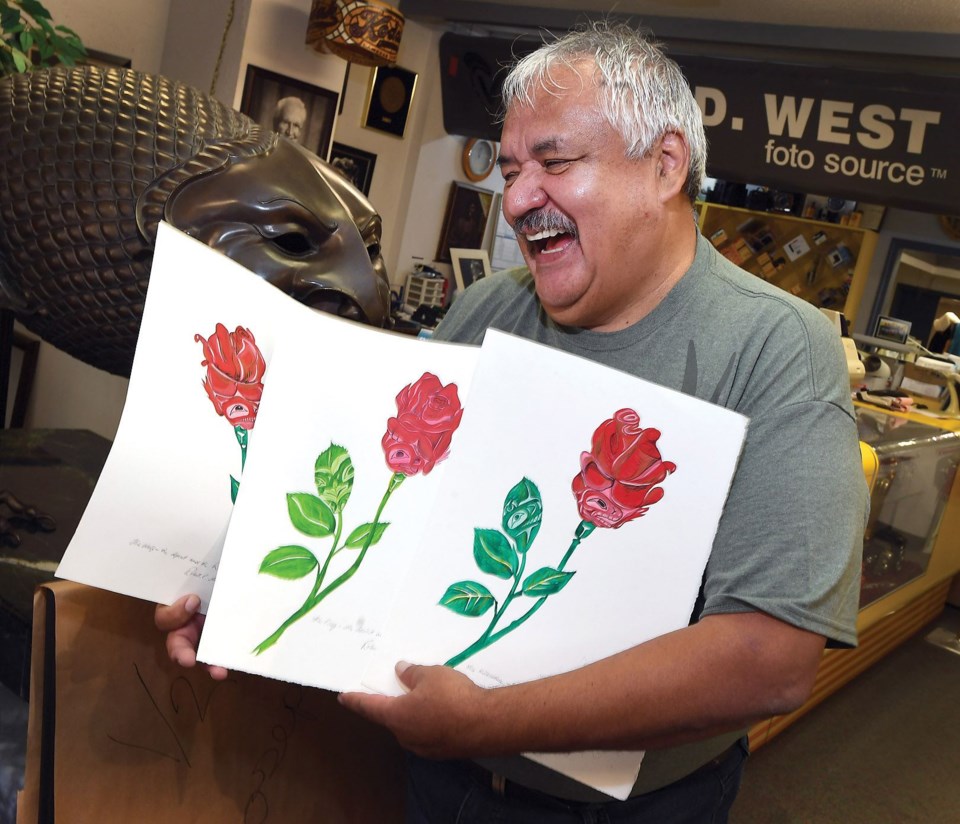Robert Sebastian is offering the world a bouquet of roses.
Plucked from the gardens of his mind, the famed Gitxsan artist has released the three flowers as his latest artistic deed. One is a representation of a frog, one a wolf, one a killer whale / fireweed in a series he calls The Spirit And The Rose. Each one stands alone, or can hang as a group.
In addition to being one of Canada's most acclaimed artists working in traditional Aboriginal style (as a painter and carver), Sebastian is also a traditional Indigenous dancer and a writer, often using the journalism and essay formats. He is a storyteller in so many of its shapes.
That has led him to travel and led him to study. It also tunes his mind to current affairs and this series of three roses was a response to world events, and how they machinate inside us as individuals even if they come to us through broadcast lenses from far away.
"There is so much in the news that talks about very bad things that impact us all in bad ways in our modern culture, and modern culture affects us all, no matter what your background," Sebastian said. "The rose has been a symbol of a very simple gesture, a romantic act, a man giving a flower to woman. I've centred this series on ladies very deliberately. It happens once in awhile, in all reality, but the deeper meaning in the giving of the rose is that the man means his affection for her all the time. We have to live this philosophy of passing on a rose as a symbol of our affections for Mother Earth, Mother Nature, the spirit that is embodied by women to grow and nurture life, and that the gesture represent what we need to feel always. We must pass this philosophy on to our children and grandchildren."
The act of love is not all on the shoulders of the man to express to the woman, he said, nor is the act of nurturing all on the shoulders of the woman. Once woman has given birth to a new life, there is a responsibility of the man, the community, and eventually the new child themselves to live in a healthy and mutually supportive way. Sebastian called this "twinning, led by the female but then joined by the man."
Sebastian said the seed of these three roses trace back in his mind to 1971 when he was a student at the College of New Caledonia. He was invited into a meeting with the originators of what would become the Prince George Native Friendship Centre. He was there at the grassroots level of what would become, today, one of the most dominant forces of healing and learning and social development in the region.
Most of those involved in the development of the organization back at the beginning, he said, were highly motivated, highly capable women.
"I was the first director of what would become the Native Friendship Centre, and I was surrounded by special aunties who guided me through the foundation of a good organization," he said.
Sebastian has been an artist embraced by celebrities, governments and international collectors. He works primarily at a studio in his ancestral territory at Hazelton. These latest creations are a combination of modern and Aboriginal traditional styles, painted with acrylics on acid-free paper.
The originals are in the process of being printed in Prince George, "which really is my second home," by Bill Harasymchuk. A release date this autumn is pending.



